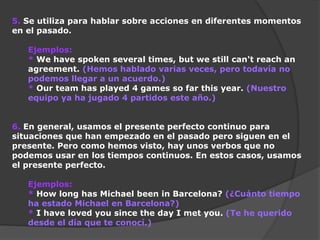Este documento explica el uso del presente perfecto en inglés. Se forma con el verbo auxiliar "to have" en presente y el participio pasado del verbo principal. Se usa para acciones que ocurrieron en un tiempo no específico antes del presente, como describir experiencias, hablar de cambios a través del tiempo, acciones exitosas, acciones aún no completadas, y acciones en diferentes momentos del pasado.









